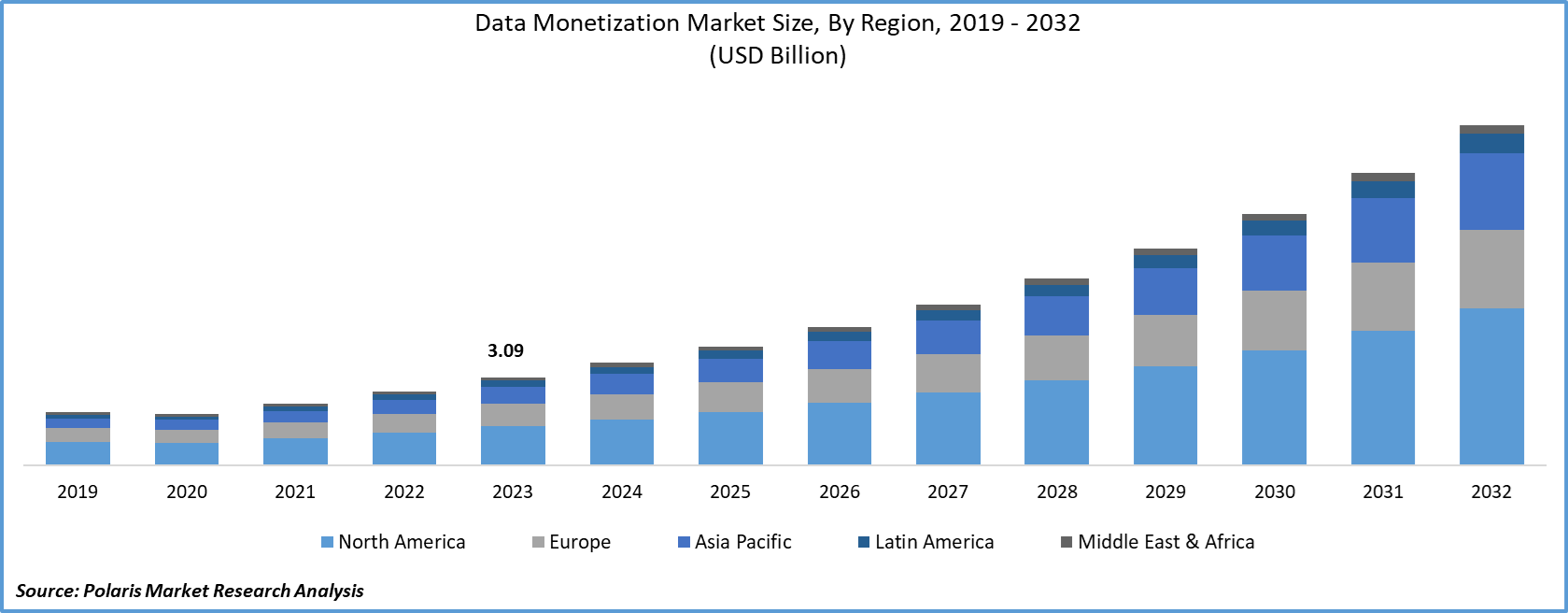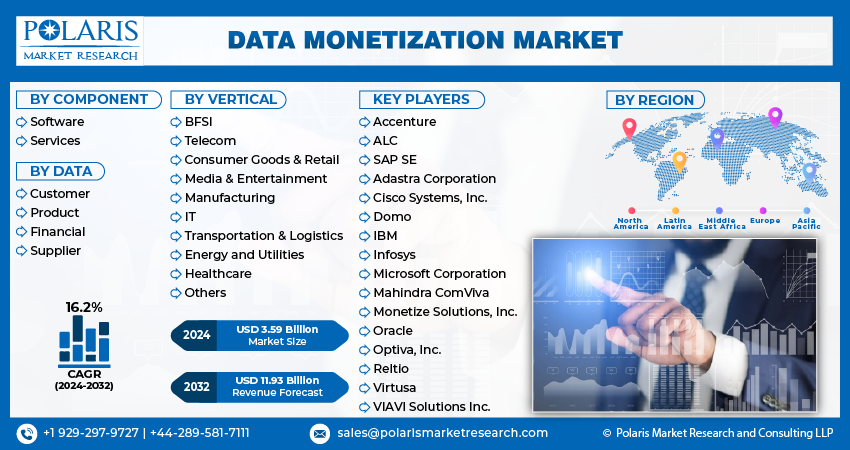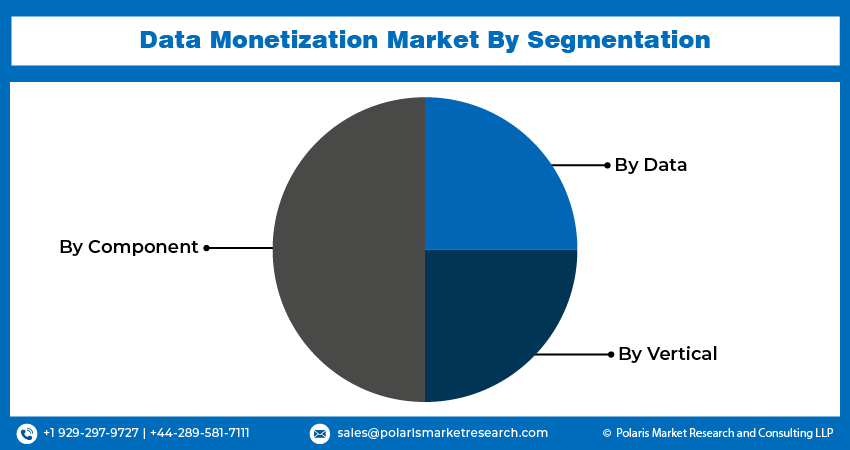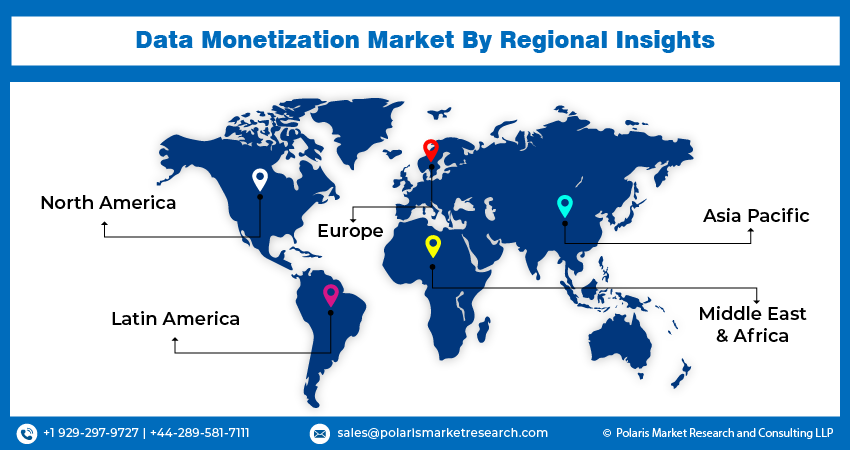
Data Monetization Market Share, Size, Trends, Industry Analysis Report, By Data (Customer, Product, Financial, Supplier); By Vertical; By Component; By Region; Segment Forecast, 2024 - 2032
- Published Date:Jan-2024
- Pages: 111
- Format: PDF
- Report ID: PM2517
- Base Year: 2023
- Historical Data: 2019-2022
Report Outlook
The global data monetization market size was valued at USD 3.09 billion in 2023. The market is anticipated to grow from USD 3.59 billion in 2024 to USD 11.93 billion by 2032, exhibiting the CAGR of 16.2% during the forecast period.
Data monetization generates quantifiable economic benefits from available information sources. The monetization process is carried out in direct or external and indirect or internal methods.
The market research report offers an in-depth analysis of the industry to support informed decision-making. It offers a meticulous breakdown of various market niches and keeps readers updated on the latest industry developments. Along with tracking the data monetization market on the basis of SWOT and Porter’s Five Forces models, the research report includes graphs, tables, charts, and other pictorial representations to help readers understand the key insights and important data easily.

Know more about this report: Request for sample pages
The internal monetization methods comprise utilizing information to make assessable business performance enhancements and take corrective resolutions. Whereas the external methods include information sharing to gain beneficial terms or conditions from business partners, selling information outright, or offering information products and services.
The companies are generating revenues through a new channel, i.e., by introducing analytics for products with information as their basis, like dashboards that provide metrics on customer choices or their product usage. Although, selling information outright in the form of customer loyalty information was in any way in the companies' pathways for years. Therefore, both such methods can be considered under the direct data monetization market.
The COVID-19 pandemic has affected almost every industry and is experiencing risks, volatility, and changes in customers’ buying behaviors. To thrive in the post-pandemic world, financial services firms and banks require an information-driven approach to create more value for the business and customers. Hence, the scope of data monetization, once the pandemic era is over, is bound to increase further.

Industry Dynamics
Growth Drivers
Various companies and industry players are increasingly using data monetization methods; owing to the increasing amount of information that is streamed and processed daily, the companies have been open to shifting from traditional to non-traditional and innovative processes. This method is a procedure where company-generated information is used to create a measurable financial profit by selling customers' information to third-party vendors.
Further, this process creates huge opportunities and opens ways for innovations. Additionally, the factors stimulating the growth of the data monetization market are cost reduction, increase in revenue, and innovative opportunities for new information-related services such as IoT, digitalization, and developments in traditional technologies.
Report Segmentation
The market is primarily segmented based on component, data, vertical, and region.
|
By Component |
By Data |
By Vertical |
By Region |
|
|
|
|
Know more about this report: Request for sample pages
The software segment accounts for the largest market share in 2021
The software segment accounted for the largest market share and is expected to grow further during the forecast year. There has been a drastic shift towards the data monetization method due to the advancement of the cloud and cloud-based technology, wherein the information cannot be stored or operated on physical hardware as this is an expensive procedure.
Therefore, utilizing cloud-based solutions provides scalable computing power and garners the software data monetization market. Further, IoT and other cloud technology allow companies to share real-time information at scale by introducing capture, analysis, discovery, storage, and dissemination.
Customer data accounted for the largest market share in 2021
The customer data segment has the largest market size and is estimated to grow even further over the forecast period. Large-scale companies gather and analyze the information before progressing to selling information to third parties. This information can be used to increase knowledge of consumer behavior significantly.
Therefore, these information sets could be important for better conversions and customer retention rates. Further, the growing adaption of the data monetization market by many companies across the globe is fueling the overall growth of the industry and is expected to boost further over the forecast period.
The telecommunication sector is expected to hold a significant revenue share
The telecommunication industry vertical accounts for a significant market share and is expected to grow further during the forecast period. This is attributed to the growing interest in the telecom industry due to the intricacy of selling and delivering a diverse range of products and extremely variable revenue prospects depending on the vertical.

The telecom information includes information on customers’ location, internet usage, behavioral and buying patterns, applications, OTT consumption, travel patterns, and so on. This aids in improving sales and customer experiences and creating innovative marketing strategies based on such information. Therefore, by sourcing the information, the telecom industry is making lucrative opportunities by building new revenue channels and thereby contributing to the growth of the industry.
The demand in the Asia Pacific is expected to witness significant growth
Asia Pacific region accounts for the largest market share and is expected to grow further during the forecast period. It is owing to the increase in the volume of enterprise information and technological advancements in analytics solutions across the region. Further, the rising importance of generating new revenue streams from the information volume of organizations drives the growth of the industry in the Asia Pacific region.
Further, there has been increased adoption of the data monetization market across various countries in the Asia Pacific region, such as India, China, Japan, and others. For instance, the Indian government recently, at the beginning of 2022, informed various ministries and departments to share all information collected among themselves, along with other companies such as start-ups and individual researchers.

Competitive Insight
Some of the major players operating in the global market include Adastra Corporation, Accenture, ALC, Cisco Systems, Inc., Domo, IBM, Infosys, Mahindra ComViva, Microsoft Corporation, Monetize Solutions, Inc., Optiva, Inc, Oracle, Reltio, SAP SE, and Virtusa.
Recent Developments
In March 2022, Domo & Moss Adams made a new agreement. Moss Adams is of the nation's largest consulting, accounting, and wealth management firms. This partnership will lead Moss Adams to leverage Domo's for assisting its clients in implementing analytics modern BI platform to enhance its client-centric strategy further.
In February 2022, Yieldbroker and New Zealand debt securities & derivatives collaborated with Sisense to use its AI-driven interactive data visualization capabilities for Yieldbroker's new data and analytics product, "YBEdge."
Furthermore, In March 2022, Data Apps was launched by Domo. It has new low-code data tools for everyone across an organization, designed to bring the benefit of information-driven decisions and actions to those underserved by traditional analytics and business intelligence (BI).
Data Monetization Market Report Scope
|
Report Attributes |
Details |
|
Market size value in 2024 |
USD 3.59 billion |
|
Revenue forecast in 2032 |
USD 11.93 billion |
|
CAGR |
16.2% from 2024 - 2032 |
|
Base year |
2023 |
|
Historical data |
2019 - 2022 |
|
Forecast period |
2024 - 2032 |
|
Quantitative units |
Revenue in USD billion and CAGR from 2024 - 2032 |
|
Segments covered |
By Component, By Data, By Vertical, By Region |
|
Regional scope |
North America, Europe, Asia Pacific, Latin America; Middle East & Africa |
|
Key companies |
Accenture, ALC, SAP SE, Adastra Corporation, Cisco Systems, Inc., Domo, IBM, Infosys, Microsoft Corporation, Mahindra ComViva, Monetize Solutions, Inc., Oracle, Optiva, Inc., Reltio, Virtusa , and VIAVI Solutions Inc., |
We provide our clients the option to personalize the data monetization market report to suit their needs. By customizing the report, you can get data as per your format and definition. Also, the customization option allows you to gain a deeper dive into a specific segment, region, customer, or market competitor.
